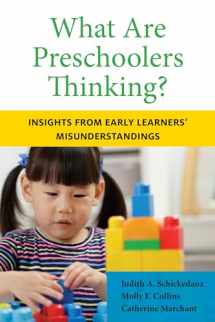
What Are Preschoolers Thinking?: Insights from Early Learners' Misunderstandings
Book details
Summary
Description
What Are Preschoolers Thinking? dispels common misconceptions about the cognitive abilities of preschoolers and demonstrates how effective early instruction can help eradicate achievement gaps.
Judith A. Schickedanz, Molly F. Collins, and Catherine Marchant, educators and researchers with combined decades of experience in early childhood education, argue that preschool-aged children are more cognitively competent than they are often given credit for. Drawing upon real-life examples from their extensive research and experience, the authors identify more than 20 misunderstandings that our youngest students commonly develop. They then show how these errors of thought reveal preschoolers' means of knowledge acquisition and patterns of thinking.
Better understanding of how our youngest students' minds work, the authors assert, leads to better instruction. They make the case that achievement gaps are caused not by differences in cognitive capacity but by knowledge gaps between students with demographic differences, such as those between students from low-income and high-income families. The authors demonstrate that well-designed, developmentally appropriate preschool activities not only instill beginning literacy and basic numeracy skills for all students but can also set the foundations for greater knowledge content and afford opportunities for higher-level thinking. This broader and deeper approach to early learning is crucial to sustaining later elementary progress.
What Are Preschoolers Thinking? enables readers to fully understand PreK students so they may help nurture their cognitive potential. This enlightening book confirms that preschool matters.
From the Back Cover
What Are Preschoolers Thinking? dispels common misconceptions about the cognitive abilities of preschoolers and demonstrates how effective early instruction can help eradicate achievement gaps.
Judith A. Schickedanz, Molly F. Collins, and Catherine Marchant assert that preschool-aged children are more cognitively competent than they are often given credit for. Drawing upon real-life examples from their combined decades of experience in early childhood education, the authors identify more than twenty misunderstandings that our youngest students commonly develop. They then show how these errors of thought reveal preschoolers' means of knowledge acquisition and patterns of thinking.
What Are Preschoolers Thinking? enables readers to fully understand PreK students so they may help nurture their cognitive potential. The authors’ broader and deeper approach to early learning is crucial to sustaining later elementary progress. This enlightening book confirms that preschool matters.
“A fascinating read, What Are Preschoolers Thinking? transforms the misunderstandings children have into a window on what children think. The authors argue that once educators and parents understand what children are really saying, we can provide the information children want.” —Roberta Michnick Golinkoff, Unidel H. Rodney Sharp Professor of Education, University of Delaware
Judith A. Schickedanz, a professor emerita at Boston University, is a leading expert in early childhood education and early literacy. Molly F. Collins is an associate professor of the Practice of Literacy Education in the Department of Teaching and Learning, Peabody College, Vanderbilt University. Catherine Marchant holds a doctorate in education and has been a classroom teacher, a teacher educator, an instructional coach, and an early childhood administrator in many forms.


We would LOVE it if you could help us and other readers by reviewing the book
Book review



